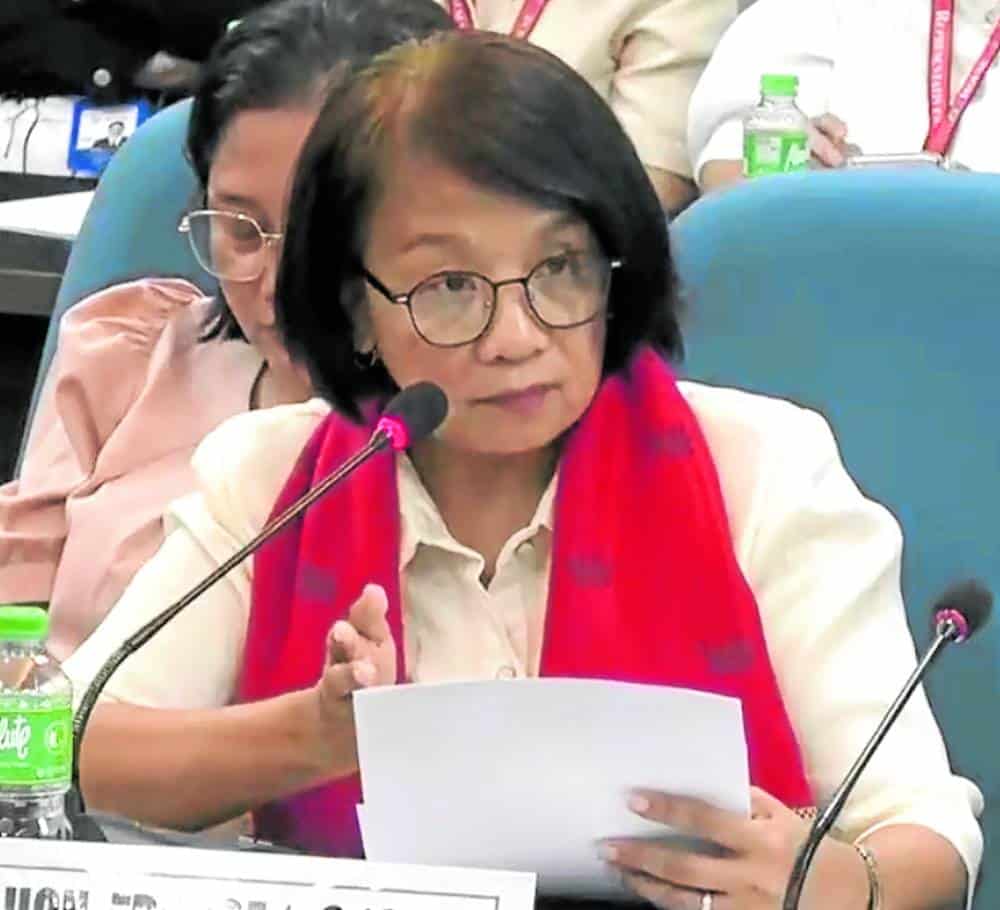
ACT Teachers Rep. France Castro —Screengrab from House of representatives video
MANILA, Philippines — With the revelation that a rewards system was allegedly implemented in the past administration’s drug war—and with the belief that intelligence funds were used—a lawmaker is asking whether the same secret allocations were used against critics of the government.
On Wednesday, ACT Teachers Rep. France Castro noted that former president Rodrigo Duterte’s tenure—both in Davao City and in Malacañang—were marked by high confidential and intelligence fund (CIF) allocations.
According to Castro, the Office of the President (OP) under Duterte had a CIF of P500 million in 2016; P2.5 billion each in 2017, 2018, and 2019; and P4.5 billion each in 2020, 2021, and 2022.
READ: Duterte, 11 others accused of crimes against humanity before ICC
READ: Garma says Davao drug war template, rewards system applied in entire PH
“It was during this time when thousands have been killed under the fake drug war and hundreds more were killed who were critics of the Duterte administration,” Castro said in a statement.
“Those times coincided with the numerous and successive raids on offices and homes of progressive organizations and activists. This was also the time that many suspects supposedly fought against police officers,” she added.
According to Castro, the practice of having big CIF allocations allegedly started when Duterte was Davao City mayor, and was supposedly passed on to his children.
READ: House quad panel to check if intel funds used in drug war – solon
“In 2016, Davao had a P144 million confidential fund, which ballooned to P2.697 billion in 2022. Then the OVP (Office of the Vice President) under VP (Sara) Duterte asked for a P125 million confidential fund,” the lawmaker said.
“In 2016, Davao had a P144 million confidential fund, which ballooned to P2.697 billion in 2022. Then the OVP (Office of the Vice President) under VP (Sara) Duterte asked for a P125 million confidential fund,” she added.
READ: Slain Masbate farmer victim of indirect ‘Red-tagging’
Castro was taking off from quad committee co-chairperson and Santa Rosa City Rep. Dan Fernandez’ belief that intelligence funds were used to bankroll the rewards system in Duterte’s drug war.
After retired police colonel Royina Garma’s testimony at the House of Representatives’ quad committee, wherein she revealed the alleged existence of a rewards system in the drug war, several lawmakers called for a deeper investigation on the possible use of the CIF in this scheme.
Fernandez on Tuesday said the possible use of the CIF will be one of the topics that may be probed by the quad committee in the next hearings.
According to Fernandez, it would take a lot of work to ascertain where the funds were used considering its confidential nature, but they can correlate the dates when alleged extrajudicial killings happened to when the CIFs were released.
INQUIRER.net has sought the side of past administration officials, but they have not replied as of posting time.
While Duterte has earned praise as his administration focused on the country’s drug problem, he was also criticized for leading a bloody war against illegal drugs. Currently, several cases have been filed against Duterte and his officials before the International Criminal Court, for allegedly committing the crime against humanity of mass murder.
Official government numbers show that 6,235 individuals were killed during legitimate anti-drug operations, but several human rights defenders believe the number could be well between 12,000 to 30,000. Last June 5, human rights lawyer Chel Diokno stressed that the Office of the President (OP) under Duterte listed 20,322 drug war-related deaths among its accomplishments in 2017.
But aside from the drug war, Duterte’s administration was also criticized for a supposed crackdown on its critics—from government officials like former senator Leila de Lima who was jailed for over seven years, only for cases against her to be dismissed; to activists who were red-tagged and killed.